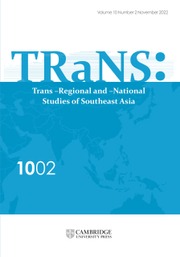ASEAN Environmental Cooperation, Transnational Private Governance, and the Haze: Overcoming the ‘Territorial Trap’ of State-Based Governance?
Published online by Cambridge University Press: 28 November 2016
Abstract
Private sustainability standards for palm oil – RSPO certification and especially the POIG/No Deforestation standards – show more promise than ASEAN in addressing the political-economic drivers of the fires/haze in Indonesia. ‘Sovereignty-free’ private actors – global NGOs, philanthropic foundations, and social investors – harnessed transnational markets and used consumer product multinationals and Asian palm oil traders/processers as intermediaries to reach oil palm growers previously shielded from private regulation. Exclusion of state actors gave regulatory entrepreneurs a freer hand to institute more stringent standards. This contrasts with ASEAN regional governance where state control of regional governance deflects global and local pressure for change. There are limitations, however, to the reach of voluntary private standards, which cannot address irresponsible cultivation practices in illegal supply chains and those catering to the domestic market, despite NGOs and other private regulatory entrepreneurs acting as ‘functional equivalents’ of state authorities in driving change. Nevertheless, palm oil's economic importance to Indonesia and the global market transformations underway mean that global private standards have a first-mover advantage. However, central state actors have denounced private standards as intrusions on national sovereignty. While private standards have sparked national conversations on sustainability, the political bargaining between state authority, private regulators, and their proponents is only just beginning.
- Type
- Articles
- Information
- TRaNS: Trans-Regional and -National Studies of Southeast Asia , Volume 5 , Special Issue 1: ASEAN communities , January 2017 , pp. 121 - 145
- Copyright
- Copyright © Institute for East Asian Studies, Sogang University 2016
References
- 10
- Cited by


